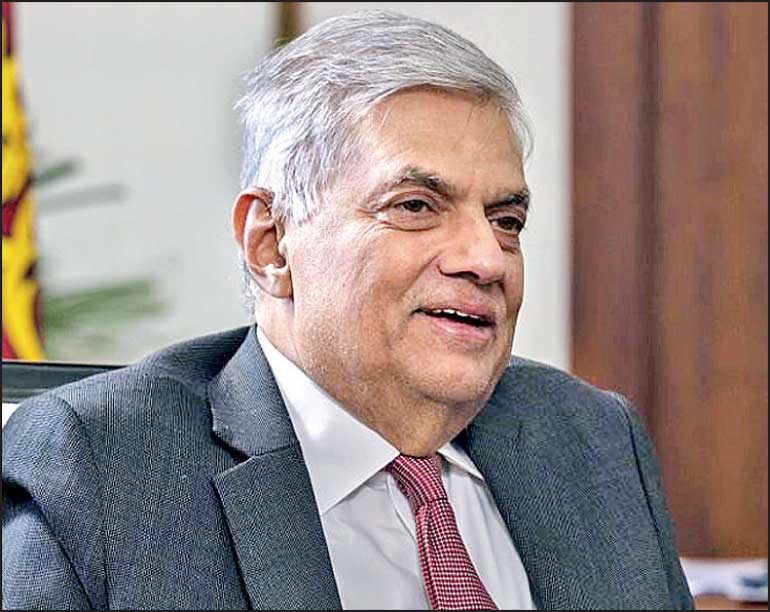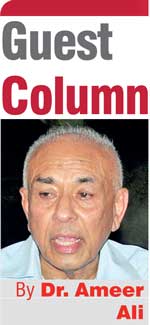Monday Feb 16, 2026
Monday Feb 16, 2026
Tuesday, 24 October 2023 00:07 - - {{hitsCtrl.values.hits}}

What is relevant for the moment is whether President RW and his regime are prepared to implement all those recommendations listed in IMF’s report
Having left the onus of economic recovery at the hands of IMF and its disciple CBSL while limiting his own role in drawing the annual budgets as Finance Minister, RW’s main concentration over the last several months had been in calculating the odds between holding an election and postponing it indefinitely. The irony is that almost all the parties in opposition have also agreed to surrender the fate of the economy at the hands of those two institutions, and that they are also calculating the same odds
 President Ranil Wickremesinghe invited the IMF to fund and facilitate the reparation of a bankrupt economy. IMF agreed under certain conditions, extended a loan of $ 2.9 billion to be released in eight instalments, and provided a roadmap for recovery expecting RW and his Government to adopt.
President Ranil Wickremesinghe invited the IMF to fund and facilitate the reparation of a bankrupt economy. IMF agreed under certain conditions, extended a loan of $ 2.9 billion to be released in eight instalments, and provided a roadmap for recovery expecting RW and his Government to adopt.
The first instalment was received roughly 12 months ago, an auditing was carried out and a diagnostic report was produced wherein IMF drew attention to a number of issues that are not strictly economic in nature but still vital for economic recovery and future growth. The attention to those issues after one year is also a tacit admission by IMF that economic recovery involves a radical overhaul of the dynamics of existing socio-political culture and ideological foundation of Sri Lanka’s governance.
Yet, even in the unlikely chance of those issues being attended to and resolved before RW’s presidency comes to a close end of 2024, whether the economy would recover and experience robust growth is doubtful, because of disturbing developments outside the country. IMF has already lowered the growth rate for this year and next. It may have to lower it further once the economic impact of the two wars that are currently escalating begins to be felt. That is a different story.
What is relevant for the moment is whether President RW and his regime are prepared to implement all those recommendations listed in IMF’s report. There are three possibilities: one, implement all of them, change the ruling system and ideology of governance and save the nation and its future generations from a bloody Armageddon; two, pick and choose only those recommendations that would be convenient to tackle and more importantly would not jeopardise the chances of RW and his coalition partners getting reelected if an election were to be held; and three, declare the intention to implement all the recommendations to satisfy IMF and get the funding continue and while using that as a pretext to postpone all elections and allow the status quo remain with some fine tuning. The President is in a political dilemma.
RW is a seasoned but sagacious politician. He was mentored by his grand uncle J.R. Jayewardene, the architect of the executive presidency and open economy, dubbed as Dharmishta Samajaya by the foremost dramatist, Professor Sarachchandra. RW knows very well that implementing all of IMF’s recommendations to bring about a paradigmatic change would be politically suicidal, because it would expose his own share in the country’s economic ruination. Therefore, his choice is between the second and third.
Having left the onus of economic recovery at the hands of IMF and its disciple CBSL while limiting his own role in drawing the annual budgets as Finance Minister, RW’s main concentration over the last several months had been in calculating the odds between holding an election and postponing it indefinitely. The irony is that almost all the parties in opposition have also agreed to surrender the fate of the economy at the hands of those two institutions, and that they are also calculating the same odds.
In this race for power, it is not the economy or the reforms that are going to dominate the electioneering platform but the issue of ethnic reconciliation and political Buddhism. It was RW who introduced the issue of reconciliation to test the political waters, but was taken aback to see that political Buddhism had highjacked his agenda and virtually put a stop to any talk of reconciliation.
When the time arrived for holding Local Government Elections this year, RW postponed it indefinitely on grounds of economic difficulties and financial bankruptcy. Now, thanks to increased foreign remittances and tourist revenue, funds are available to finance a presidential election. But will he hold one? IMF’s diagnostic report appears to have given him another excuse to postpone it on the ground that he is determined to implement most if not all of them but needs sufficient time. IMF and its shareholders may agree to that option.
In the meantime, RW is wooing the minorities for their support in case he decides to go for an election. With political Buddhism showing its aggressive face in the north and east of the country Tamils have no alternative but to support him. But the Muslims are a wavering lot. This is why RW has been particularly keen to cultivate their political friendship and some his recent actions bear testimony to this fact.
Starting with the lenience he showed towards that Muslim Parliamentarian who was caught smuggling dutiable items, to the appointment of a retired Muslim Supreme Court judge to head the investigation over allegations televised from UK about the 2019 Easter massacre, the handover of the controversial Punani Campus to its Muslim owner who is preparing to re-enter politics, lighting in green the Lotus Tower on the day of Prophet Muhammad’s birthday, and posting police to guard the mosques during Friday prayers in the wake of the Israel-Palestine war were plain vote buying measures targeted at Muslims.
Alternatively, RW is also preparing the ground to protect himself and his Government in case the election is postponed on the pretext of implementing IMF reforms. But more than those reforms the challenges facing the 2023-24 budget, which has to compensate for the fall in revenue targeted by the previous one, are formidable and would certainly make life even harder for the vast majority of people. The aswesuma palliative introduced after the current budget would be hardly sufficient next year to arrest the increasing pain and rising incidences of poverty. That economic reality and IMF’s demand for reforms would be sufficient enough for considering election postponement. But that would test the patience of the public.
However, Sri Lankan masses are not tuned to stage protracted protests and resistance as in Latin American countries. Even that leaderless 2022 aragalaya, which did not have any coordinated program other than the singular slogan “Gota Go Home”, would have fizzled out and dissipated had the Rajapaksa regime allowed it to continue for some time. However, short term rallies, strikes and demonstrations mixed with violence are a normal part of Sri Lankan politics and RW knows that very well. Recent legislations like ATA, Broadcasting Authority Bill, and Online Security Bill are measures specifically intended to tackle such short-term outbursts. The post-2023-24 budget weeks or months would show how the President intends to get out of the political dilemma facing him.
(The writer is attached to Murdoch Business School, Murdoch University, W. Australia.)